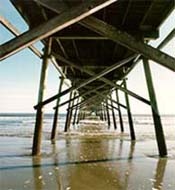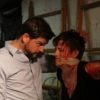
Meet Ross McElwee
Written by Hillary E. Cutter | Posted by: Anonymous
His next big hit, "Sherman’s March: A Mediation to the Possibility of Romantic Love in the South During an Era of Nuclear Weapons Proliferation" (an admittedly absurd title, 1986) won McElwee the Best Feature Documentary at Sundance. In this film, he retraces General Sherman’s Civil War route, interweaving this journey with portraits of seven southern women he meets along the way. Widely acclaimed "Sherman’s March" led to the sequel, "Time Indefinite" where McElwee documents his shift to adulthood, getting married, and confronting the death of his father. In all of McElwee’s films he plays the role of director, photographer, and editor.
McElwee has won numerous awards for his films including Best Documentary, Atlanta Film Festival, for "Time Indefinite" (1993), and Best Documentary, Hawaii International Film Festival and Sundance for "Six O’clock News" (1996). He has been awarded fellowships from the Rockefeller Foundation, the Guggenheim Foundation, and the National Endowment for the Arts. He is currently a Lecturer and Filmmaker-in-Residence at Harvard’s Department of Visual Studies.
His new film, "Bright Leaves" (working title) takes us to his home state of North Carolina, where he began his career as a studio cameraman for local evening news, housewife helper shows, and "gospel hour" programs broadcast by the local television station. We are brought to the home where his great-grandfather created the famous brand of tobacco known as "Bull Durham." The audience takes a journey across the social, economic, and psychological tobacco terrain of North Carolina. McElwee says it is somewhat biographical and samples the attitudes about tobacco culture and addiction.
HC: What sparked you to do a film about tobacco?
McElwee: My cousin sent me a newspaper article about tobacco and my great-grandfather was mentioned in it. I began to think about the implications and wondered if my family was in some way responsible for the prominence of the tobacco industry. However, the film is not about the health issues or addiction. It’s an academic question.
HC: You mentioned that the 1950 Warner Brothers melodrama, "Bright Leaf," starring Gary Cooper and directed by Michael Curtis ("Casablanca") is supposedly loosely based upon the story of your great-grandfather. You are hoping to use segments from the film, with Cooper playing the role of John Harvey McElwee. How do you plan to accomplish this?
McElwee: I need to work to get the final cut and know the exact context in which I hope to use the segments. Then I can move forward and try to gain the rights.
HC: What is the exact stage of your current film?
McElwee: I have one or two days of shooting left and then I will need to cut down the present piece by 20 minutes. It works as a beginning, middle, and end and is close to completion. I also have lab work including sound and mixing to finish.
HC: Where do you plan on shopping your film?
McElwee: Once the film is complete I will have a screening at the Harvard University Carpenter Center. Traditionally, teachers show films first to gain acknowledgment and support to finish. Then I will circulate it around Europe and the United States. My goal for festivals is Sundance, Seattle, Toronto, and Montreal. I would also like to enter into the New England Film/Video Festival but it’s all based on the timing and completion of my film.
HC: Where do you hope to receive funding?
McElwee: The Boston Community has always been very helpful to local filmmakers especially non-commercial productions. I am looking for support from PBS, Channel 4 in London, and the LEF Foundation.
HC: Is it easier to receive grants now that you have proven yourself as a filmmaker?
McElwee: It’s more competitive now with a whole new generation of filmmakers. When I began, no one knew what to do with non-fiction films. Now there is a consciousness of what filmmaking is, there’s less security.
HC: What are your philosophies on filmmaking?
McElwee: I try to make films idiosyncratic and representative of different takes on the world. I want to interest people and create stories based on experience but that have a universal appeal. I film unscripted and use a spontaneous cinema verité approach. My films never turn out the way I think and I usually find a story I don’t expect during the filmmaking process. It makes for a more interesting piece.
HC: How have you progressed as a filmmaker?
McElwee: I evolved with a style I am comfortable with and have learned to move on to make the next film. Boston has been a great place for me to display non-fiction work and WGBH has been an affirmative source and educational institution.
HC: Who are your mentors?
McElwee: Edward Pincus, founder of the MIT Film Section and a pioneer of the personal documentary; Richard Leacock, one of the pioneers of the cinema vertité movement and a professor of Cinema at MIT for almost 20 years; and Fred Wiseman, a filmmaker with an exceptional body of work exploring American Institutions. They all have a strong Boston connection. Boston is a logistically convenient place to be a filmmaker and has a great support system.
Several of Ross McElwee's films can be purchased at BuyIndies.com, including 'Sherman's March,' 'Six O'Clock News,' 'Time Indefinite,' and 'Charleen & Backyard.











